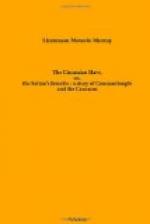The cold-hearted Bey never dreamed of the real cause of her illness. True, he had suspected her of being too unguarded in her habits, and had laid restrictions upon her liberty, but as to disappointment in love being the cause of her malady, indeed it did not seem to his heartless disposition that love could produce such a result. She was perhaps the only being in the world who had ever caused him to realize that he had a heart. After thinking long and much upon the illness of his child, he resolved to seek her confidence, and turning his steps toward the harem, he found his drooping and fading flower reclining upon a velvet couch. Seating himself by her side, he parted the hair from her fair, young brow, and told his child how dearly he loved her, and if aught weighed upon her mind he besought her to open her lips and speak to him. Zillah loved her father, though she was not blind to his many faults.
“Dear father, what shall I say to thee?”
“Speak thy whole heart, my child.”
“Nay, but it would only displease thee, my father, for me to do so.”
“Tell me, Zillah, if thou knowest what it is that sickens thee, and robs thy cheek of its bloom?”
“Father,” she answered, with a sigh, “my heart is breaking with unhappy love.”
“Love!”
“Ay, I love Selim, he who saved me from drowning in the Bosphorus.”
“The Sultan’s officer?”
“Yes, father, Capt. Selim.”
“Why, child, that young rascal is a notorious dog of a Christian. Do you know it?”
“I know he believes not in the faith of our fathers,” she answered, modestly.
The old Turk bit his lips with vexation, but dared not vent the passion he felt in the delicate ear of his sick child. Indeed he had only to look into her pale face to turn the whole current of his anger into pity at the danger he read there.
The old Bey knew the spirit that Zillah had inherited both from himself and from her mother, and that she was fixed in her purpose. She frankly told him that she could never be happy unless Selim was her husband. The father was most sadly annoyed. He referred to the best physicians in the city to know if a malady such as his daughter suffered under, could prove fatal, and they assured him that this had frequently been the case. One, however, to whom he applied, informed the Bey that he knew of a Jewish leech who was famed for curing all maladies arising from depression, physical or mental, and if he desired it, he would send the Jew to his house on the subsequent day, when he would say if he could do her any good as it regarded her illness.
Much as the Mussulman despised the race, still, in the hope of benefiting his child by the man’s medical skill, he desired the Armenian physician to send the Jew, as he proposed, on the following day, and paying the heavy fee that these leeches know so well how to charge the rich old Turks, the Bey departed once more to his palace.




